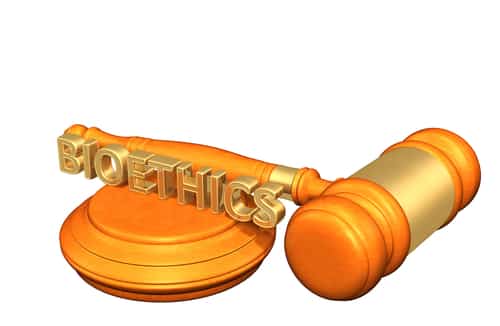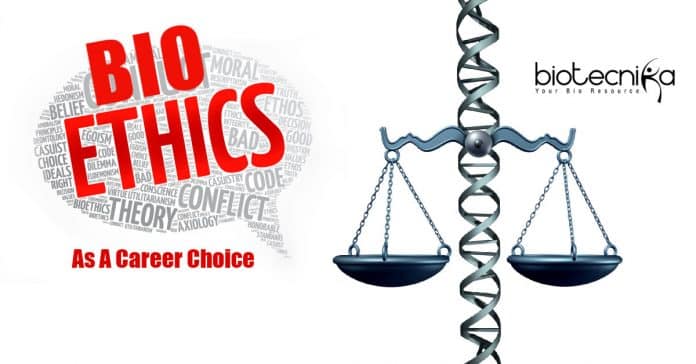Careers in Bioethics: Bioethics Scope, Career Options
& Educational Requirements
One of the most essential aspects of everyone’s life is their careers. It is extremely important to build a strong career. Career affects an individual’s life in several ways. Though almost everyone dreams of a pleasant successful lifestyle, not everyone is able to build a strong career that is the main part of the same process. The career path that we choose has a direct impact on our entire lifestyle. Different fields have their own importance, merits and demerits, hence none of the fields can replace with the other one. So, it is immensely important to choose your career pathway by your own interest, not by others’ opinions.
This article will give you an idea of Bioethics as a career option. It is extremely necessary to clear the idea about this subject field first.
Bioethics, this interdisciplinary subject, addresses the ethical issues in the biological science research related field and in the medical science field. The term Bioethics was coined by Van Rensselaer Potter, an American biochemist. This term derived from the Greek word “bios”, meaning “everything to do with life” and “ethike” which can be described as analysis and
management of the ethical issues related to the medical and biological science or emerging from advances in science.There is no doubt that the world is moving to an extraordinarily fast-paced world. Advanced medications, drugs, and vaccines have evolved with the help of technologies and modern biomedical sciences, and most of the diseases have also become curable. The population of the entire world has continued to grow over billions of peoples, with the advent of modern science and technology, we are able to continue to satisfy the human demand and necessity as well. However, most of these modern scientific advances have some ascertain ethical dilemmas. Dilemmas are usually related to medical practices and are specifically more important. The scope of bioethics becomes distended with biotechnology including human genetic engineering, gene cloning, and gene therapy other processes that involve the manipulating pathways of basic biological science through the modification of biomolecules like DNA, RNA, and protein sequences.
How Can We Determine What is Okay and What’s Not?
Bioethics is one of the fields of study that deals with the ethical issues related to medical and biosciences. This field came up with the idea of philosophers, lawyers, scientists, and public health professionals together. Bioethicists are concerned and deal with the applications of moral-ethical principles in the field of medical science or healthcare. They are involved in making decisions in a wide variety of areas.
Some specific areas within the Bioethics are:
- Clinical Ethics: The main aim of clinical ethics is to provide a proper quality of health care to patients, a practical direction to provide proper assistance to the health care professionals by the analysis of the ethical issues that mainly emerge during clinical practice, clinical trials, and clinical research.
- Health policy: Public health ethics aims to maintain the balance of privilege and liberty of individuals with the responsibility of governments to provide the proper medical care to their nationals.
- Genetics: Genetics ethics is the study of righteous inference of new scientific discoveries in the field of human genetics. Modern genetic technologies have a great potential impact on medical practice, but it can be easily misused that can lead to the development of bigotries and inequality among human beings around the world.
- Precision Medicines: This is one of the zestful fields which invests the latest research advances into individual treatments. Though precision medicines use genomic data in order to develop improved treatments and diagnosis of major diseases like cancer, cardiovascular diseases, it also develops ethical challenges.
- Research Ethics: Specifically deals with the ethical challenges, questions, and analysis of those issues that arise during the conduction of scientific research, trials involving humans, and animals.
- Reproductive Ethics: With the invention and application of in vitro fertilization techniques to solve the infertility issues, social relationships of human reproductive events also underwent thoroughgoing changes. Reproductive ethics is concerned about the ethical issues related to human reproductive events like surrogacy, contraception, assisted reproductive technologies such as Artificial insemination, Induced ovulation, Invitro fertilization (IVF), Gamete intrafallopian transfer (GIFT), Preimplantation genetic testing (PGT). It is extremely important to ethically analyze all the reproductive technologies and its applications, as these reproductive ethical issues are directly related to the female’s health and rights.
Why is The Bioethics Field Important?
In this digital era of the 21st century, it is necessary to make the students conscious about the moral-ethical values, and research is one of the most important activities of human beings that can lead to the economic and technological advances. So, if it is performed by 
Bioethicists are working as an advisor, trainer, an alliance among healthcare professionals, researchers or doctors, and the patients and with patient’s family members. The main focus of bioethicists is on the ethical implications of healthcare processes and practices, and they seek to alleviate the concern by sticking into moral-ethical principles.
The field of Bioethics involves philosophers along with lawyers, public policymakers, medical anthropology to come together to look at the very important challenging moral issues and stratagem issues that are facing every generation. With the advent of modern science, humans can do phenomenal good things, but science can also develop things that are not so good. There are certain processes that require ethical analysis. Bioethics is one of the most evolving fields in science. Modern science is becoming more and more enlightened, the opportunities for transforming biological sciences occur continuously, so without any doubt the ethical issues will be rising continuously. For that purpose, we must have experts who have studied in this specific field and made it their career for analysis of the ethical issues by paying serious attention to the ethical problems.
The bioethical issues initially made an appearance in the United States, but these ethical issues rapidly advanced towards the global phenomenon. The United Nations Educational, Scientific and Cultural Organization (UNESCO) sponsored the World Bioethics Day for the very first time on 19 October in the year of 2016. Bioethics now plays a consequential role in the determination of public policies across Europe, Australia, Canada, America, Israel, Pakistan, Japan, Singapore, South Korea, and among so many other locations also. Though in India the medical ethics field has a uniquely mixed genealogy, due to the globalization of the healthcare industry, India has become an efficient supplier of resources, medicinal products for the global health Industry, that continuously demands the elevation of the Indian ethics regulatory groundwork to meet the international standards.
How To Become A Bioethicist?
Those who are inclined to invigorate their future career in the field of bioethics, definitely they will be finding golden opportunities in the academic, clinical research related fields.
Educational Requirements:
- To start a study in this field, one must take up the science stream with the main focus and keen interest in Biology at their 10 + 2 board level or any of its equivalent.
- At the graduate degree level, students are required to choose the subject which is similar or closely related to bioethics. The most appropriate would be the bachelor’s degree or BTech. in biotechnology. Even at the graduation and post-graduation levels, students can study directly specialization in bioethics subjects as well.
- Certification Programs like Post graduation diploma programs with a major focus on bioethics will also encourage the students to start their career in the field of bioethics.
Many institutes both in India and abroad are offering courses in bioethics. Following is the list of institutions in India offering bioethics courses:
- Astron Institute of Social Sciences, Haryana- offering course in Medical Law and Bioethics
- Indian Council of Medical Research, (ICMR) Bioethics Unit- Karnataka
- PSG Institute of Medical Science and Research, Center for Research and Bioethics, Coimbatore, Tamil Nadu.
List of Institutions around the world offering courses in Bioethics:
- Columbia University, USA
- Harvard Medical School Centre for Bioethics, USA
- Centre for Bioethics, University of Philadelphia, USA
- King’s College, London
- University of Kentucky, USA
- University of Bristol, UK
Registrations Open For Legal Genetics Certification Course
Career Opportunities in the Bioethics field:
Within the developing field of bioethics, your focus of work will be on analyzing and solving the ethical issues in medical practice and research work. Hospitals, Universities, Research organizations need bioethics lawyers.
Based on your personal interest, you can choose your career in a specific sector. It highly depends on your specialization and expertise, you will be a Medical Ethicist or Bioethics Lawyer, or even a Bioethics Faculty.
- Bioethicist: A bioethicist is also sometimes called a clinical ethicist or a medical ethicist. These are healthcare professionals who specialize in helping patients, families, and medical teams solve medical ethics dilemmas and they usually have either a Ph.D. or MD/DO and advanced fellowship training.
- Bioethics Faculty: In the rapidly expanding field of bioethics, universities, institutions, or even schools are also required teachers who can train future innovators, so academic bioethics is one of the most demanding jobs at present time. Even a physician or any healthcare professionals can also take bioethical training, as the employment of these specialists is expected to be in high demand in the near upcoming future.
-
Physicians & Surgeons: Ethical dilemmas are nowadays handled by the staff of medical clinics. Specialists are being called on to handle these tasks as the bioethics field grows. You can choose a discipline in the health care field and then focus on bioethics to work in this capacity.
-
Medical Scientists: New developments in biological and medical sciences often come with ethical consequences. Research bioethicists work to make sense of these consequences. Some researchers work for consulting companies, while others work for academic institutions. Medical scientists conduct research with the purpose of improving the health of human beings.
-
Patent Officer: You can choose your career path as a Patent Officer also. With the increase in the biological research activities that involve human biological materials like genes, a hurdle towards the commercialization of inventions that are usually derived from human biological materials can involve unethical affairs. Ethical practices in the biomedical research field are one of the significant objects that creates an impact on the decisions regarding the grants of patents on inventions. So as a patent officer you will be involved in assessing whether the inventions are brand new and ingenious, and therefore eligible to be patented. Patents are usually granted by the government and it gives inventors the right to halt other parties from copying their invention for up to 20 years.
So, there are several ways to start your career in bioethics. Even if you can achieve your degree as a Physician or as a Nurse first, after that you can take some additional training specializing in Bioethics. Overall, the understanding of the healthcare system and training in bioethics are two important keys in order to accomplish a successful career in bioethics.
Bioethics can offer a great career prospect, but to achieve a successful career not only in the field of bioethics but in any other field, it requires your personal interest, specifically in the current scenario where students are open to so many options. So, choosing the right career is one of the challenging tasks. First of all, students need to assess their own adroitness and interest, depending on your interest you can take necessary measures. Always remember, the only way to become thriving in your career path, you must be passionate about your work. That’s why you choose your career by your interest, not by other’s estimations.







































